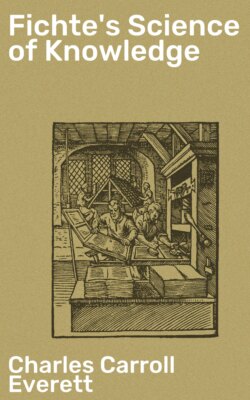Читать книгу Fichte's Science of Knowledge - Charles Carroll Everett - Страница 11
На сайте Литреса книга снята с продажи.
IV. Unity in General.
ОглавлениеTable of Contents
We have seen that Kant, in each of the spheres of thought, leaves certain elements not incorporated into the unity of a system. The Thing-in-itself stands outside, with no apparent relation to any part of his philosophy. The Categories and all forms of intellectual activity are accepted without being made to appear to have any organic relation to one another. The elements that enter into the higher moral life stand also disconnected. Each of these spheres thus lacks unity. Still more glaring does this lack of unity become, when we attempt to combine these various spheres into any absolute relation. The moral world and the intellectual world stand over against one another as though they belong to different universes.
The fact as last stated was obvious to Kant himself. In his introduction to the “Critique of the Faculty of Judgment,” Kant recognizes these distinct realms. One is theoretical; the other is practical. One has for its governing principle the Understanding; the other, the Reason. He recognizes the fact that here is opened an unbounded, but also an inaccessible field for knowledge. The two realms stand over against each other as if they were so many different worlds. The one is the world of the sensuous, or the natural; the other is the world of the supersensuous or the supernatural. Of these, the first can have no influence upon the second; the second, however, should have an influence upon the first. The idea of moral freedom should make the end toward which the practical reason points, actual in the world of the senses. In this case, it must be possible to regard nature in such a way that its laws are fitted to cooperate with those of moral freedom, and to work for the same end. There must, therefore, be a principle of unity by which the natural and supernatural are made one. The supersensuous principle which underlies nature, and the supersensuous principle which underlies the realm of freedom must have some common ground. This common ground cannot be reached either by the understanding or the reason, but it must make possible a passage from the one realm of thought to the other.
Fichte refers to this passage as the most significant part of this very significant book.[8] In examining it and the principles to which it refers, he insists that in Kant’s system there are three absolutes. The first of these is the sensuous experience, which includes the whole sensuous world, so far as this is recognized by Kant. This is the realm of the understanding. The second absolute is the moral world, the world of the reason. The third is the principle which Kant recognizes as the common ground of both. Though it is the common ground, yet it cannot be seen as such; we cannot bring into a single thought the two absolutes first named as springing from it. If I am to recognize it at all, I must recognize it as a third absolute.
Fichte states expressly that the statement of Kant which we are here considering was the historical point from which his own independent speculation started. This statement by Fichte is a very important contribution to our knowledge of the development of his system. We might have assumed the fact to be as he asserts it; but it is none the less interesting to find him consciously recognizing this definite relation to the system of Kant, pointing us to the very sentence that roused his intellectual activity to its real work. This statement of Fichte furnishes, as we shall see, the key to his system. It literally describes the problem which he set himself to solve. This problem is the reduction of the theoretic reason and the practical reason to a common principle. This result involves all the others that have been named. It involves, on the one side, the unity of the theoretical processes, and thus the deduction of the Categories and the rest; and, on the other, the recognition of the nature of the object of sensuous perception, the Thing-in-itself. It involves the introduction of a similar unity into the world of the practical reason, and finally it involves what is indeed, as we have seen, the gist of the problem, the reduction of the world of the Understanding and that of the Reason to a common principle.
